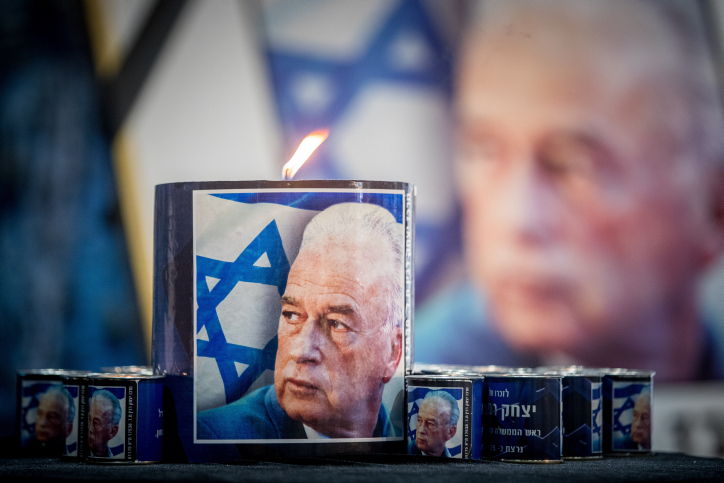
Two of Israel's national traumas will be enshrined in memory through their fateful dates: October 7th 2023, when Hamas launched a murderous terrorist attack against Israeli citizens, and November 4th 1995, when an Israeli Jew assassinated the Prime Minister of Israel, Yitzhak Rabin. The first wound is still fresh and bleeding, while the second was almost forgotten this year in the shadow of the developing war. However, it is more relevant now than ever.
As a middle school student at the time of the assassination of Prime Minister Yitzhak Rabin, I clearly remember the feeling of shock that gripped me and most of the public. Many people spoke then of the loss of innocence, of not believing that a citizen would assassinate a democratically elected prime minister in the State of Israel, the dream of the Jewish people for generations.
The danger posed by fanatical currents who do not accept the elected government’s dictates became tangible and painful. For those who supported the peace process that Rabin led, his murder also became a symbol of the death of the “dream of peace.”
The traumatic event was named “November 4th.” Stickers reading 4.11.95 filled cars around the country. The national day of remembrance, which was announced just two years after the murder, was set for the Hebrew date of the 12th of Cheshvan. But the date that stuck in national memory is the date in the Gregorian calendar.
When I grew up, I started working in education. I taught children in the youth movement, students in schools and teachers in training. Every year, the day of remembrance for Rabin's assassination was packed with activities and meetings that dealt with the importance of democracy – maintaining the rules of the game to be able to manage bitter societal disputes.
I attempted to explain that the killer was a single person, but he was part of a wider circle of people who enabled the heinous crime he committed, either by incitement of extremist views or by indifference to them. That the killer's goal was not only to murder Rabin, but to destroy each of our ability to be a free person who determines their own fate and the fate of their homeland. I tried to convey that there is no place for any form of political violence or subversion of the decisions of a democratic government.
As the years passed, the trauma of November 4th faded. Most of the education system rarely delved into the deeper meaning or current relevance of the event, and were content with recalling Rabin’s personal history and sending superficial messages against violence. I found myself talking about the murder with teenagers and teachers who were born after it happened, making it no longer a personal experience for them. My trauma and that of my generation was a distant event for them, which had to be adapted to current events.
The last year has put everything I have been educated towards over the years to the test. With the rise of the current government, extensive reforms to the judicial system were initiated, which was perceived by the opposition as serious damage to the essence of Israeli democracy. An unprecedented civil struggle began, with demonstrations attended by hundreds of thousands, again raising the same old questions about the democratic rules of the game.
Can the two “camps” of Bibi supporters and Bibi opponents live together, despite their fundamental disagreements? What is required for that to happen? Where is the line between sharp and legitimate criticism, and toxic and dangerous discourse? Is the refusal or the threat of refusal of military service legitimate? And why did the leaderships of the two political camps reject the possibility of a compromise, which could have calmed the bitter storm overwhelming the public discourse?
***
And came the Hamas attack on October 7th.
The huge numbers of dead, the organized brutality of the killers, the army and the government that were absent for long hours, the security concepts that were broken, the villages that were burned, the welfare systems that failed to respond, and the ongoing nightmare of the families of the hostages are only part of the trauma that befell Israeli society.
The date became a symbol, a concept in and of itself, two words that describe the breaking point, the outcry, and pain and anger. Many tattooed the date on their bodies, and many more vowed never to forget it.
The internal struggles were put aside, and all of Israeli society rallied to fight its external enemies and help the citizens affected by the terrible situation. The public mourning and the ongoing war led to the cancellation of the state ceremonies commemorating the day of remembrance for Rabin's assassination, whose official date, the 12th of Cheshvan, was last week. November 4th, the traumatic date from 28 years ago, passed almost without mention.
If Israel wants to choose life, it must remember these two traumas and their lessons going forward. October 7th will forever be a painful and terrifying reminder of the fragility of the existence of a Jewish state in the Middle East, and of our obligation to do everything possible to ensure its existence.
And November 4th must remind everyone of the necessity for Israel to also be a democratic country, which knows how to contain deep fractures without violence, and which can enable a just coexistence between people from a wide variety of backgrounds and stances. A country where there is no room for exclusion and harm to any person or public, a country which encourages solidarity and mutual respect, not hatred.
Our chance to ensure Israel's existence for the future generations lies in our ability to understand the necessity of dealing with external threats alongside internal social tensions. This is a challenge for the present and future leaders of Israel, as well as for every person that lives and will live here. October 7th and November 4th will be our reminders.






